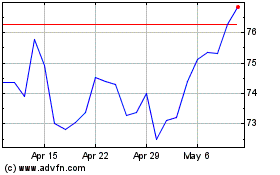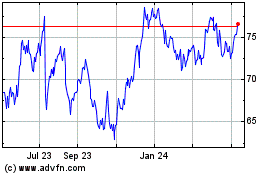State Street Intensifies Its Shift Into Data -- WSJ
July 21 2018 - 3:02AM
Dow Jones News
By Justin Baer
This article is being republished as part of our daily
reproduction of WSJ.com articles that also appeared in the U.S.
print edition of The Wall Street Journal (July 21, 2018).
State Street Corp. is paying nearly $3 billion in cash to prove
it is serious about its transformation from sleepy custodian to
tech-savvy data manager.
The Boston bank said Friday it had agreed to buy financial-data
firm Charles River Systems Inc. The decision is its boldest move
yet to step out of its financial-services clients' back offices and
onto their trading floors, where State Street can offer data,
analytics and trading tools to investment staff.
"Our overall strategy even before we started talking to Charles
River has been about data, and about this idea that information
delivered in an appropriate way and in a usable way is the most
powerful tool we can provide to market," State Street President Ron
O'Hanley said on a conference call with analysts.
Reacting to the agreement, some investors said they were
concerned State Street is paying too much, and skeptical the
company would be able to meet all of the revenue targets laid out
in the deal.
State Street's shares fell 7.4% on Friday, their biggest one-day
drop in more than two years. The stock closed at $85.87, down
$6.87.
To help pay for the acquisition, State Street canceled plans to
buy back about $950 million in company stock this year. The firm
will spend $2.6 billion on the acquisition -- nearly nine times
Charles River's revenue in 2017.
Boston-based State Street also reported quarterly results that
fell short of some analysts' expectations.
"There's definitely some strategic sense to it," Glenn Schorr,
an analyst with Evercore ISI, said of the Charles River deal.
"Execution-wise, it will take time and will be hard to do."
Charles River, a closely held firm based in Burlington, Mass.,
runs a software platform used by more than 300 investment firms,
wealth managers and other financial-services companies -- many of
which overlap with State Street's client list. It has 745 employees
and tallied revenue of more than $300 million last year.
Mr. O'Hanley said Charles River's founder and chief executive,
Peter Lambertus, owns nearly all of his company's equity. He will
serve in a consulting role as State Street completes the
acquisition.
The bank will appoint a new CEO to run Charles River, which will
be a stand-alone division within State Street. The bank expects the
deal will begin to add to its earnings in 2020.
The deal comes as State Street and other custody banks look to
pull out of a yearslong rut of low revenue growth as
financial-services firms push to lower the fees they pay for
custody and accounting. The industry's biggest players, including
State Street and Bank of New York Mellon Corp., have slashed
expenses in a bid to lift earnings.
But investors want them to boost revenue, too. Those firms are
betting technology, and the sweeping digitization of financial
markets, will emerge as a panacea, of sorts -- allowing them to
automate functions and lower costs, but also giving them the tools
to harness the reams of data they collect from clients as custodian
to trillions of dollars in assets.
State Street, which performs core administrative and accounting
tasks for 86 of the world's largest 100 money managers, has been
steadily adding to its own data and analytics offerings. The bank
estimates there is an $8 billion market for those tools. Bloomberg
LP and BlackRock Inc.'s Aladdin unit are among Charles River's
biggest rivals.
The Charles River agreement is also the latest bid by Mr.
O'Hanley to lean on acquisitions to speed up State Street's
transformation. As head of the firm's asset-management business, he
had championed State Street's 2016 purchase of General Electric
Co.'s investments division.
Mr. O'Hanley did a series of deals as president of BNY Mellon's
asset-management arm, and joined State Street in 2015 after a
four-year stint at Fidelity Investments. He is slated to succeed
Joseph Hooley as the bank's chief executive at the end of the
year.
State Street announced the Charles River agreement minutes
before it reported second-quarter net income of $698 million, or
$1.88 a share. The profit figure marked a 20% increase from a year
earlier, when the firm earned $584 million, or $1.53 a share.
Included in the latest results was a $77 million charge, or 17
cents a share, related to job cuts and management changes related
to its continuing push to automate functions and eliminate
expenses.
Excluding the charge, State Street earned $2.05 a share.
Analysts polled by S&P Global Market Intelligence had expected
a per-share profit of $2.01.
Total revenue rose 7.7% to $3.03 billion.
Write to Justin Baer at justin.baer@wsj.com
(END) Dow Jones Newswires
July 21, 2018 02:47 ET (06:47 GMT)
Copyright (c) 2018 Dow Jones & Company, Inc.
State Street (NYSE:STT)
Historical Stock Chart
From Jun 2024 to Jul 2024

State Street (NYSE:STT)
Historical Stock Chart
From Jul 2023 to Jul 2024
